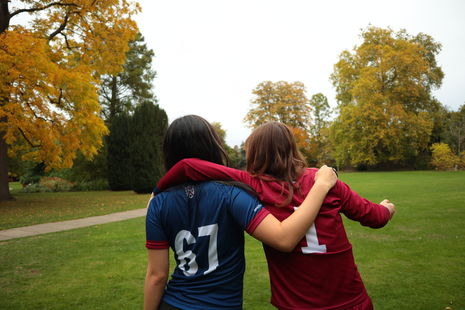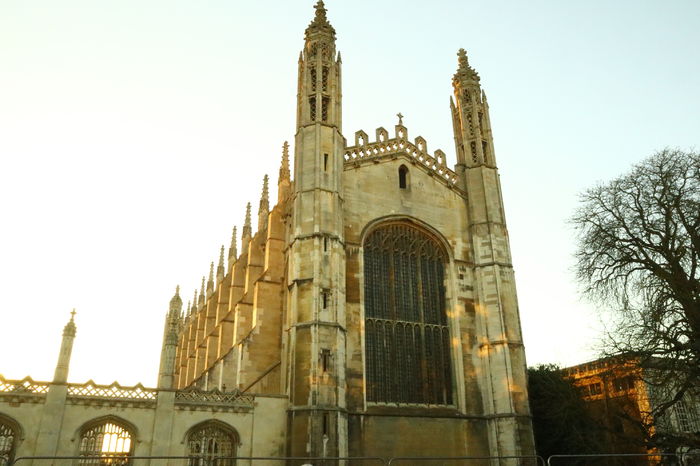Footy captains fury over trans athlete ban
New FA guidance has resulted in CU Women’s Association Football changing their constitution

Several women’s and non-binary college football captains have expressed concerns about plans to ban college football teams from fielding transgender and non-binary players, in advance of the new football season.
The change comes in the wake of new guidance by the Football Association (FA) which states that players must be “biological females” in order to compete at college level.
However, the changes have been criticised by those involved in the collegegame, with former Jesus captain Lara Branston describing it as a threat to a“vital queer-inclusionary community”.
The acting Vice Captain of the Clare team said she was “disgusted” by the changes, while the Captain of the Caius-Catz-Hughes team stressed that “it’s not right”. The college league, Branston argued, “is defined by its inclusion.”
Varsity understands that club captains raised their objections at a meeting last Thursday (9/10), which was attended by university sports staff. At the meeting, several captains pushed back against an email sent by the University’s Director of Sport, Mark Brian, on the 30th of September, which advised clubs to “adhere to the regulations of national governingbodies”.
Cambridge’s Deputy Director of Sport, Karen Pearce, told captains that, while inclusivity was a top priority, the University had a responsibility to abide by the law, as do students organising sportscompetitions.
She added that governing bodies, like the FA, provide a framework for compliance with the law. Failure to follow FA guidance would heighten the risk of a legal case being brought against the club, given that CUWAFL is responsible for adhering to the law, and is liable for all players on the pitch.
Varsity understands that the University has been receiving expert advice from an outsourced legal team on this issue.
Captains discussed changing the league from women’s to mixed to ensure trans inclusion. Several captains expressed support for reworking and renaming the league, and they are set to vote on the issue before the start of the new season.
Branston, who is also the Women’s Blues captain, voiced her support forthe proposal, arguing that “the anxieties around including trans players are not felt by the college captains”.
Branston praised the university sports staff for their efforts to maintainan inclusive environment despite the law changes, but added that “trans inclusion in these spaces is very important on a welfare level for trans people and their livelihoods”.
“Of course people want to be competitive, and teams want to win, but because of the nature of these teams being extremely mixed ability, what is important is playing a game of football, not who’s playing,” she continued, “the whole point of college leagues is thateveryone has a good time and feels included”.
“This comes after a Supreme Court ruling in April, which determined that “protected” single-sex spaces must be reserved for women as defined by their “biological” gender. The judgement also stated that transgender men could be excluded from women’s spaces because of their “masculine appearance”.
Cambridge SU condemned the ruling at the time, writing: “Trans, non-binary and gender-non-conforming people have always existed and will always exist, and their identities are valid irrespective of any court ruling.”
Regarding the question of sport, the SU stated that it wanted “intercollegiate sport to continue to honour self-1D, keeping participation in sports open to as many people as possible”.
The 25/26 Captain of the University Women’s Football Second team said, “In my opinion, college sport should be an inclusive and welcoming space for everyone […] I’m very disappointed that there are discussions about excluding trans people from participating.”
However, in order to abide by the law, the Cambridge University Women’s Association Football League (CUWAFL) has updated its constitution in line with new FA guidance. These regulations state that“transgender women will no longer be able to play in women’s football in England”.
Reflecting this change, the revised CUWAFL constitution states that “only biological females (ie. those born with ovaries) may play in open age Matches and Competitions that are reserved forwomen”.
Individuals who have “begun the use of or […] used testosterone as partof gender related treatment,” are also ineligible to compete in the women’s college league “until four years have passedsince their last use”.
A Newbroke team member said “This is a shift from the previous constitution, which claimed “for transgender and non-binary players, players are able to choose which league they would feel comfortable playing in”".
The change is also in contrast to the response of the Joint Blues Committee- which regulates the “Blues” status of sports clubs and eligibility for varsity matches - when the FA rules were announced. Committee President Tads Ciercierski-Holmes told Varsity in June that he retained his belief in “promoting participation in every way possible for trans students”.
Concretely, this meant continuing the Committee’s existing policy of supporting “transgender and non-binary athletes participating in University sport on behalf of the gender with which they identify”. The ultimate decision about each athlete, however, has always rested with the Director of Sport at Cambridge.
At the time, Ciercierski-Holmes recognised that a changing legal situation could scupper his plans for transgender inclusion.
“The FAs not the only sports association to bar transgender women from’women’s sports. The Scottish Football Association, England Netball, and the England and Wales Cricket Board have all done the same.
The Supreme Court case that provoked these changes was brought bygender-critical advocacy group For Women Scotland after the Scottishgovernment issued statutory guidance stating that the definitions of “man”and “woman” in the Equality Act included those who had legally transitioned.
The judges found that the terms in the Act referred only to “biological sex”, the definition of which they “assumed to be self-explanatory and to requireno further explanation”. The ruling did not alter the Gender Recognition Act or transgender discrimination protections.
In response to the judgement, the Equality and Human Rights Commission (EHRC) released interim guidance on how it should be interpreted.
This guidance stated that transgender people should be restricted from groups and facilities matching their gender but could also be barred from those matching their sex. While transgender people should not be left without facilities, the EHRC argued, only providing mixed services could constitute discrimination against women.
After receiving backlash, the EHRC launched an extended public consultation. The completed guidance has not yet been released to the public or MPs.
When asked about the ruling in August, Cambridge University Sportsaid: “Whilst we await the guidance from the Equality of Human RightsCommission (EHRC), we continue to support our students, staff and community users, ensuring access to toilet, washing and changing spaces for mixed sex users, in addition to our single sex changing room areas.
“The sports service fully supports all our student participants in sport and a review of our policies will take place, to ensure we meet the finalised EHRC guidance.”
A statement from the University’s Sports Committee on student participation in competitive sports stated:
“University Sports clubs and societies are responsible for their own operations, including decisions on eligibility and access of trans athletes to training, events and participation in competitive leagues. This is currently an area in which the interpretation of the law, and applicable guidance, is developing quickly. Clubs and societies are advised to follow the approach and criteria used by the relevant National Governing Body (NGB) when considering trans inclusion, and to align their policies to support access to relevant leagues (e.g BUCS, local/regional/national competitions and anycompetition that the club or society organise, including college competitions).”
 News / Colleges charge different rents for the same Castle Street accommodation2 March 2026
News / Colleges charge different rents for the same Castle Street accommodation2 March 2026 News / King’s hosts open iftar for Ramadan3 March 2026
News / King’s hosts open iftar for Ramadan3 March 2026 Theatre / Lunatics and leisure centres 4 March 2026
Theatre / Lunatics and leisure centres 4 March 2026 News / Angela Merkel among Cambridge honorary degree nominees27 February 2026
News / Angela Merkel among Cambridge honorary degree nominees27 February 2026 News / News in Brief: waterworks, wine woes, and workplace wins 1 March 2026
News / News in Brief: waterworks, wine woes, and workplace wins 1 March 2026








